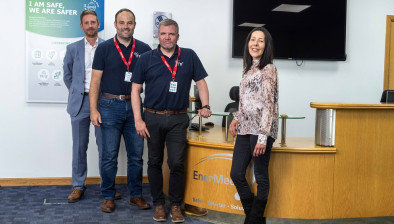ECITB invests further £2m in Regional Skills Hubs
The Engineering Construction Industry Training Board (ECITB) is to invest a further £2 million for Regional Skills Hubs over the next two years.
In November 2023, the ECITB announced a £1m investment to boost training provider capacity and grow new entrant numbers amid significant skills shortages in the engineering construction industry (ECI).
The Regional Skills Hub Funding initiative was set up to address these skill shortages by supporting projects focused on enhancing training and skills provision, in particular in the six major industrial cluster regions at the heart of the UK’s decarbonisation agenda.
The industrial cluster hot spots are the Black Country, East Coast (comprising Teesside and Humber), North West England, Scotland, South Wales and the Solent.
This funding has already helped projects in the Humber region, Teesside, North East Scotland and Great Britain as a whole, with further projects set to be announced shortly.
In recognition of the success of the scheme so far and the high-quality funding bids being submitted, the ECITB Board has committed to invest more funding to further build training capacity.
Andrew Hockey, ECITB chief executive, said: “We are delighted with the impact of the Regional Skills Hub Funding initiative.
“Our Labour Forecasting Tool predicts that the ECI could need thousands of additional workers over the coming years for major projects, including those that contribute to the country’s net zero goals.
“Without a pipeline of trained, skilled workers all this risks not being achieved, which is why we are keen to work with more clients, contractors, training providers and industry partners to invest in growing the number of skilled workers needed for other major engineering construction projects now and in the future.
“This extra investment will help further address skills shortages by enhancing training and assessment infrastructure and capabilities at both colleges and independent training providers located in Britain’s industrial heartlands that will directly increase the flow of trained workers into the industry.”

The first recipient of Regional Skills Hub Funding was Humber-based training provider, CATCH. It was awarded £300,000 in January 2024 to help upgrade its existing welding, pipefitting and electrical training facilities in Stallingborough near Grimsby.
The upgrade to its Welding and Pipefitting Hub, which opened in September 2024, was part of a joint venture with industry to increase learning capacity by 100% over two years.
3t Training Services was the second recipient and awarded £200,000 in October 2024 to support the build of three mobile training units. Two units have already been deployed to deliver training for workers on ECI projects in the North West of England and have the potential to support skills in other areas where there is insufficient training provision.
This will create capacity to grow hundreds of new entrants to industry, with the units delivering ECITB-approved courses in mechanical fitting, pipefitting and plating to ECI employers across Britain.
The ECITB also worked with industry partners as part of the Net Zero Teesside cluster project, which received a £478,000 funding boost in March 2025 amid growing demand for skilled workers in the region.
The funding will contribute to an immersive pipefitting, welding, mechanical and project-based training rig and includes enhanced pipefitting facilities.
Regional Skills Hub funding of between £50,000 and £500,000 is available to projects that meet set criteria. This includes:
• Forecast capacity-building should be at least a 25% increase against current output.
• Projects need to match ECITB funding from industry partners.
• Training and assessment activity must be delivered against recognised industry standards.
• Projects must feature a lead role for at least one ECITB-approved training provider.
• The funding can be used to support either capital or operational expenditure. Capital expenditure may include upgrading training equipment or facilities. Operational expenditure may include curriculum development, training for staff, industry secondments and engagement of SMEs to support training development.
Find out more about Regional Skills Hub funding here.























